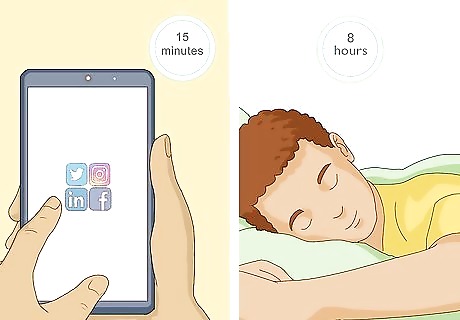
views
Talking About It

Decide exactly what you want. Before you sit down with your parents, know exactly what you want from them. Having specifics can help your parents understand what you need, while also giving you a place to start negotiating from. For instance, maybe your specific goal is to be able to go out on Friday nights with your friends. Alternatively, maybe your goal is to go to the library to study by yourself or to go to the mall with your friends. Maybe your goal is to walk or drive to school by yourself.

View your parents as being in the same boat. If you view your parents as your enemy or a barrier in the way of what you want, you're going to end up fighting. Instead, think about your parents as being on your side, because they are. Be willing to work with them.

Ask your parents to sit down with you. If you want your parents to treat you with respect, you have to present your case in a mature and reasonable manner. Choose a good time to sit down and talk to them. In fact, it's better to ask them when would be a good time. If you choose a bad time, your parents probably won't be as able to hear what you have to say. You could say, "I'd like to discuss something important with you. When would be a good time for us to sit down together?"

Express your emotions with "I" statements. Once you sit down with your parents, lay out why you wanted to talk to them. Express what you want and why you think you are ready for it. However, make sure to use "I" statements instead of "you" statements. For example, you could say, "I feel like I need more independence. I've been wanting to go out with my friends on Friday nights for a while, but I know you have concerns about it. However, I feel like I'm ready to do some things on my own." Using "I" statements is better than saying, "You never let me do anything." That will just put your parents on their guard.

Listen to their concerns. When you sit down with your parents, you need to be willing to put yourself in their shoes. Actually listen to what they have to say with an open mind and try to understand why they feel the way they do. If your parents have been limiting your independence, it's likely because they are worried about your safety. Let them know you understand what they're feeling. You could say, "I know you care about me and that's why you don't want me to go out. I know you just want me to be safe, and I'm thankful for that."

Talk about possible solutions. Once you've heard their concerns, you may be able to come up with solutions together that make both of you happy. Think about ways you can help them be less concerned about you and be willing to compromise. For example, if your parents are concerned about your safety, ask what you can do that would make them feel better. Maybe you could check in every hour to let them know you're safe. Maybe they'd feel better if they get to meet the people you're going out with. Figure out ways you can both feel better.

Stay calm. You may get angry at what your parents have to say, and that's okay. You have a right to your feelings. However, you don't have a right to do whatever you want with your feelings. You can say that you're upset, but you should do so in a calm manner. Yelling or arguing will make the situation worse. For example, if your parents don't think you're ready to go out by yourself, you could say, "I'm sorry to hear that. I feel upset about it. How can I work to gain your trust?"

Accept their decision. If you whine or complain, that's only going to make matters worse, as you're showing you're not mature. If you show maturity in accepting their decision, you may have better luck in the future when you make the request again.
Getting Permission for a Particular Event

Bring up the topic at a good time. Just like when you're having a big, serious discussion, it's best to ask permission to go out at a good time, too. Don't pick a time when your parents are busy making dinner or trying to get out the door. Plan ahead a bit, and ask early. If you don't, your parents may just say "no" out of instinct. Instead, pick a time when your parents seem to have time to talk, such as at dinner or when they're relaxing.

Tell them how you know you will be safe. Your parents want to know that you will be safe while you're out, so you need to tell them how you know that will happen. Having details about the event will help calm your parents' fears. For example, you could say, "I'd like to go to a party at a local club. I know that worries you, but this club is just for kids under 18. They have security guards posted all around the club, and no drugs or alcohol are allowed. The club closes at midnight, and I will come home right after. I'll also be with Jess, Joan, and John, and we will all watch out for each other. I can check in every hour if that makes you feel better."

Accept their conditions. If your parents are willing to let you go, be willing to accept some conditions. For instance, if you're going to a club, they may want to drive you. While you may not like it, you should give a little, so that they feel better about you going. Part of being in a family means meeting each other in the middle.

Try not to whine. If you get a "no," try not to whine about it. Accept it, and move on. If you have maturity in accepting the decision, maybe your parents will have a different answer next time. You can't force your parents to change their minds, and whining will only annoy them. For instance, you could say, "Even though that upsets me, I understand why you said 'no.' I hope I can prove I'm trustworthy enough to go do something like this in the future."
Building Trust

Talk to your parents more often. If you're at a stage where you are wanting to get out more, you may not feel like talking to your parents much. You want to get away from them, not spend more time with them. But if your parents are going to trust you, they need to know who you are as a person. Spend time talking to them each day about what's going on in your life and what interests you. You don't have to talk about the big, serious stuff every day. Talk about the little things. Tell your parents what cool thing you saw today or what made you think. If you learn to talk about the little stuff, talking about the bigger stuff won't seem like such a big deal.

Follow the rules. If you want your parents to trust you more, you have to show them that you respect what they say. Obey the rules they set out for you and the household. If you constantly break the rules, your parents are not going to trust you to be out on your own.

Treat family members with respect. Being able to go out on your own means you have a certain maturity. Part of being mature is showing respect for the people around you, even when they make you mad. Treat your parents and siblings in a kind manner, and resolve issues without throwing a temper tantrum. For example, say your sister borrows something without asking and breaks it. An immature response would be to yell at her, tell her she's awful, and that she needs to fix it. A mature response would be to confront her calmly. You could say, "I'd appreciate it if you'd ask to borrow things in the future. That item was really important to me. Would you please help me repair it?"

Do what you saying you're going to do. One way to build trust is to follow through on your word. If you say you're going to do the dishes, do the dishes. If you say you're going to the library to study, actually go to the library and study. Your parents will notice when you don't follow through, and they'll be less likely to trust you.

Show responsibility. To get your parents to give you more independence, you need to show that you already have independence. Take responsibility for the things you need to do in your life. For instance, you should do your chores before you're asked by your parents and even take on extra chores that you see need doing. It also means doing things like getting your homework done on time without being nagged by your parents. You could also volunteer to take care of your siblings so your parents can have a night out or cook dinner as a surprise for your parents.














Comments
0 comment